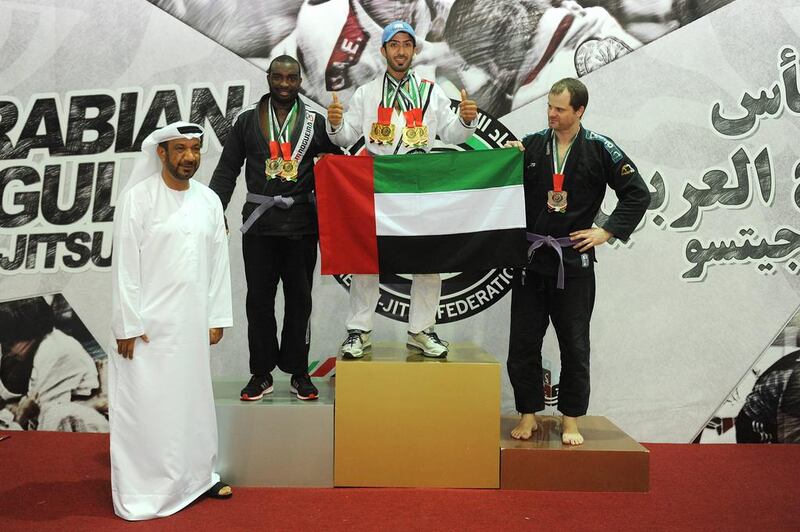He has won everything. The Arab Championship, Gulf Championship and the Abu Dhabi Cup. In April, he claimed a first medal at the sixth Abu Dhabi World Professional Jiu-Jitsu Championship.
Success, however, has not blunted his competitive edge. For Ahmed Suhail bin Huwaiden Al Ketbi, the UAE’s most famous jiu-jitsu fighter, winning is everything.
On Tuesday, he said he had just returned from Germany, where he finished second in the Munich Open. Then he began preparations for the next big challenge, the Emirates Super Cup, starting Friday in Abu Dhabi.
He sounded irritated.
“I don’t want to go into the reasons why I finished with the silver medal,” he said. “I will say that some of it was down to my mistakes and some of it is down to the refereeing decisions.”
In Abu Dhabi, some of the world’s most talented fighters will once again be present, and Al Ketbi has long been comfortable in this sort of company.
“I’ve been participating in jiu-jitsu for six years, and until now I have won 45 prizes in various competitions,” he says. “Gold medals, silver medals, bronze medals, and many other cups in a lot of events.”
He is proud of his achievements, but he is not complacent. Despite his impressive haul, the powerful young man remains as fiercely competitive as ever. Stay fit, and look to the future, his motto seems to be.
“As long as I am healthy and take care to avoid injuries, keep working hard, as well as being totally committed, then I will continue to fight,” he says.
Al Ketbi is perhaps the best of a generation of Emirati fighters in which the country’s jiu-jitsu federation has heavily invested.
“Our leaders have continued to back us through everything,” he says, before adding why he sees jiu-jitsu as a positive influence on Emirati culture. “The long-term benefits of jiu-jitsu are clear: discipline, leadership, patience, reduced anger and increased self-confidence.”
Al Ketbi also sees practical, non-competitive advantages.
“Should you be in a situation where trouble arises, the skills you have acquired from jiu-jitsu will help you handle the situation responsibly.”
Perhaps such advice is already creeping into the psyche of the country’s youth. Jiu-jitsu today is one of the most popular, and fastest growing, sports in the UAE.
The first-class facilities in the country have helped make jiu-jitsu accessible and raised its profile.
Events now crowd the calendar. In April, the Abu Dhabi World Professional Jiu-Jitsu Championship took place at Adnec; in September, the Arabian Gulf Jiu-Jitsu Cup was contested at the UAE Judo Wrestling and Kick Boxing Federation headquarters; last month, the Asian Cup Open was held at Sheikh Rashid bin Maktoum Hall at Al Wasl Club.
Starting tomorrow, as part of the UAE’s 42nd National Day celebrations, the Emirates Super Cup will take place at Al Khubeirah Garden on Abu Dhabi’s Corniche.
The sport’s growth is not only about facilities and attracting overseas talent; the country’s leaders have supported home-grown talent unconditionally.
“We are provided with every advantage in this country,” Al Ketbi said. “We really cannot complain about anything, financially, and in terms of resources we have been given everything we could possibly ask for.”
The Asian Cup Open in Dubai saw 56 male Emirati fighters, as well as three female competitors, take part alongside participants from across the world, many of whom were members of local clubs.
Of the 172 fighters taking part in tomorrow’s No Gi competition, 46 will be Emiratis, the rest from 34 other countries. On Saturday, the Gi division’s larger pool of 218 competitors will have 48 Emirati men and four women. And the children’s competition, which runs across Sunday and Monday, has attracted 1,560 contestants.
As the most prominent Emirati fighter, Al Ketbi is a role model for his countrymen, and he believes they will benefit from the same advantages that he has. It is all thanks to the interest that the country’s leaders have taken in jiu-jitsu.
He said the personal backing he has received from Sheikh Mohammed bin Zayed and Sheikh Tahnoon bin Zayed is not only a privilege but also a responsibility.
It is a responsibility that he has carried well.
Al Ketbi is not alone. Since Sheikh Tahnoon introduced jiu-jitsu to the country in 1998, with the foundation of the Combat Club, the sport has blossomed. UAE authorities now see it as one that can define Emirati youth in the coming years.
Jiu-jitsu, Al Ketbi is confident, will become the nation’s “biggest sport after football”. Considering the other sports that it has to compete with, those are fighting words, indeed.
akhaled@thenational.ae
Follow us on twitter at @SprtNationalUAE





